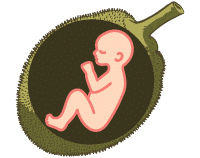
In the week 39, your baby is
the size of a Jackfruit
At week 39, your baby is almost here! Prepare for the big day with final body changes, labor signs, and essential tips to welcome your little one.

As you enter the 39th week of your pregnancy journey, your body and your baby are preparing for the birth. This is an exciting time filled with anticipation and a mix of emotions. Your little one is nearly fully developed and ready to make their grand entrance into the world. Let's dive into the details of what's happening during this crucial week.
At 39 weeks pregnant, you may experience a range of symptoms as your body gears up for labour:

Pelvic Pressure and Discomfort: As your baby moves into the pelvis, you may feel increased pressure and discomfort, a natural part of your body getting ready for labour.
Your little bundle of joy is nearly ready to make its debut. Here's what's happening with your baby at 39 weeks:


You're strong, resilient, and doing an amazing job. Trust your body—your little one is almost here, and you're ready for this beautiful journey ahead!
Your body is going through incredible changes as it prepares for the big day. Here's what you can expect:


Stay active
Moderately intense exercise is great for you, but avoid sports that risk abdominal injury.

Prenatal diet
Make your diet nutritious and include prenatal vitamins containing folic acid and iodine.

Hospital check-in
If you notice blood in discharge or your water breaks, head to the hospital immediately

Diet check
Always seek your doctor’s advice to make sure your diet intake is safe for you.

Choose together
Make an informed decision along with your family about your pregnancy treatment options.

Calm labour
Practice yoga or hypnotherapy techniques to ease stress and discomfort in abnormal labour.

Prenatal guide
Attend all your prenatal appointments like vaccinations, tests, ultrasounds
to track vitals
Regular check-ups with your healthcare provider are essential during the 39th week of pregnancy. Here's what you can expect:


Discover trusted advice from experts for all stages of your parenting
Yes, it's common to feel anxious and experience mood swings due to hormonal changes and the anticipation of labour. Try to relax and focus on positive thoughts. Discuss your feelings with your partner or healthcare provider for support.
Gentle exercises like stretching, walking, and prenatal yoga can help maintain flexibility and reduce discomfort. Listen to your body and avoid any activities that cause pain or discomfort.
True labour contractions are regular, increase in frequency and intensity, and don't go away with movement or rest. You may also experience a rupture of the amniotic sac (water breaking) or a bloody show (mucus discharge tinged with blood). Contact your healthcare provider if you suspect you're in labour.
Spotting can be a sign of the mucus plug being lost, which is a normal occurrence as your body prepares for labour. However, if you experience heavy bleeding or have concerns, contact your healthcare provider immediately.
While most of your baby's organs are fully developed, the lungs and brain will continue to mature even after birth. Your baby is ready to make their arrival, but some development will continue in the weeks and months to come.
Essential items to pack include comfortable clothing, toiletries, a camera, snacks, and any important documents. Don't forget items for your baby, such as a going-home outfit, diapers, and a car seat. Check with your hospital for any specific guidelines or recommendations.
The duration of labour varies for each woman and each pregnancy. First-time mothers often experience longer labours, while subsequent labours may be shorter. On average, active labour lasts around 4-8 hours, but it can range from a few hours to a day or more.
Try relaxation techniques like deep breathing, meditation, or prenatal yoga to help manage discomfort. Gentle exercises, warm baths, and massage can also provide relief. Don't hesitate to ask for help or support from your partner, family, or friends.